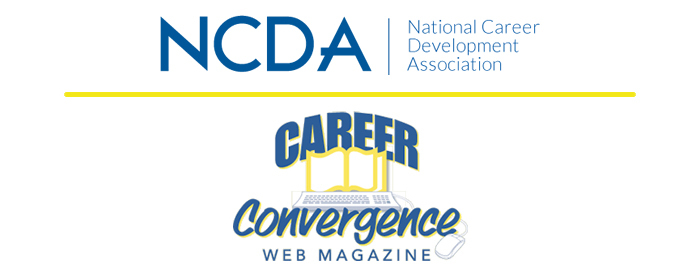
|
| April 01, 2020 |
|
Are you a helping professional looking for support with COVID-19? If you only have 10 minutes, please start here by viewing NCDA's curated list of resources (which we will update regularly). Several articles in this month's issue of Career Convergence will directly help practitioners (be sure to read the Message from NCDA Headquarters), and, as always, we offer opportunities for professional development whenever you are ready. FeaturesSystems Theory Framework: A Culturally Responsive Model for Career GuidanceBy Michelle M. LovaszWhen broader shifting career contexts result in marginalization, practitioners can respond relevantly with the Systems Theory Framework of Career Development. This theory offers a model that allows for the writing of individual differences, presents a frame for co-constructing career guidance, and has the potential for individual career advocacy. Complete Article >Counselor Educators & ResearchersCounselor Educators, Working Identities and Constructing a Better, Healthier WorldBy Victoria ShivyThe COVID-19 pandemic has disrupted everyone’s personal and professional lives. Changes to work –already occurring— have accelerated, and no one can know what the ‘new normal’ will be. Working, including performing academic work, offers a personal source of fulfilment, structure, and identity, for our students and ourselves. But now, work itself, the context is in flux, to a degree that feels frightening and strange. How can counselors help construct a better, healthier world? Complete Article >Independent PracticeHold onto Your Hats: The Multi-faceted Role of Career Practitioners During the COVID-19 PandemicBy Michelle TullierThe COVID-19 pandemic brings career, financial, medical, mental health, and logistical challenges for our clients. As independent practitioners, we can make a major, positive impact in others’ lives during this crisis by examining the sub-roles of a career development professional. These roles, or “HATS,” are Helper/Healer, Advisor, Teacher, and Strategist. Complete Article >K-12Learning by Doing: Tiny House Brings Community TogetherBy Caroline BertrandCommunity support allowed a school to build a livable tiny house on wheels and teach students technical skills and team work. This article describes how a comprehensive high school partnered with business community stakeholders to assist with students’ career exploration activities in the construction industry. Complete Article >Post-SecondaryEngaging Faculty: Strategies for College Career ServicesBy Clemente I. Diaz and Valeria DiazReports indicate that students view faculty as the most valuable source of career advice. Our survey identified how faculty currently incorporate career-related themes into their courses, why they may not focus on student career development, and what services/resources they would like college career services to provide faculty. The results from this survey may be useful for engaging and developing faculty buy-in. Complete Article >WorkplacesExploring and Addressing Generalized Anxiety Disorder in the WorkplaceBy Eda TalushllariMost recently, the population has been dealing with the novel Coronavirus (COVID-19) global pandemic. Due to the uncertainty and fear in the world from the Coronavirus, it is natural for individuals to experience higher anxiety levels. It is important for career counselors to understand the impact that anxiety and anxiety disorders have on clients to best assist them during this stressful time in history. Complete Article >NCDA NewsDear NCDA CommunityA Message from NCDA HeadquartersNCDA is taking steps to ensure safety, information, and care are the center of our work and yours. View our message of concern and examples of resources available during the COVID-19 world crisis. Complete Article >Tech TipsUpdate Your Social Media with these Visuals to Encourage Flattening the Curve and Practice Social DistancingYou may want to update your social media or websites with messages that encourage everyone to flatten the curve and practice social distancing. This could be useful for the people you support too. Some of your clients may be self-employed, some of your students may be freelancing in communications and some of your organizations may need a helping hand with social media or websites about COVID-19. Here are a few time-saving resources that are free to use, without having to give credit to the creators. Social Distancing Graphics from NCDA - free collection of simple done-for-you visuals created by the NCDA communications team. You can add your logo or use them as-is. Please freely use these in your social media headers and posts and on websites, without having to give credit to us. Canva - free collection of done-for-you colourful graphics from Canva, who created this collection with the World Health Organization. Please freely use these in your social media headers and posts and on websites, without having to give credit to Canva or WHO. And find more here too. Unsplash - free curated album of 150+ visuals for use in your communications about coronavirus. These fall under a creative commons license, that means you can use them freely without giving credit to the photographers or the Unsplash. This site has countless more you can use for other purposes as well.
Tech Tip submitted by Ali Breen and the NCDA Communications team. abreen@ncda.org |
Phone: (918) 663-7060
webeditor@ncda.org
